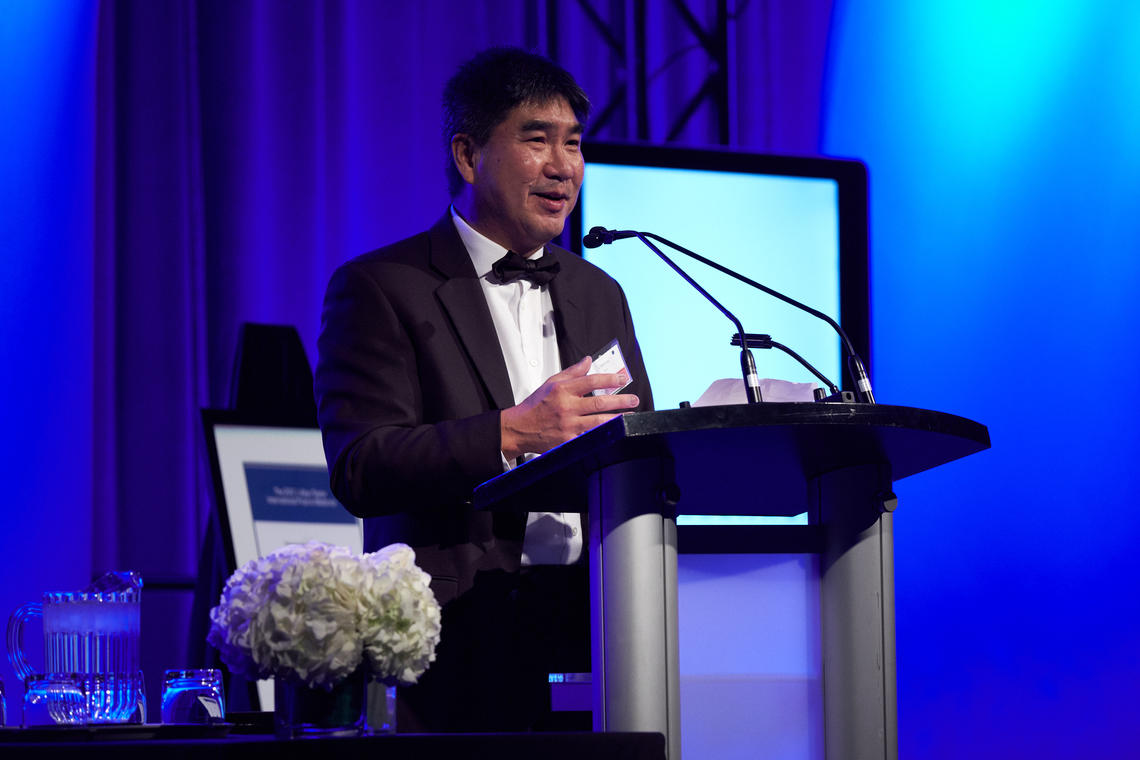Dec. 20, 2017
Cumming School's V. Wee Yong awarded prestigious international prize

V. Wee Yong gives his acceptance speech at the award ceremony in London, Ontario.
Robarts Research Institute
V. Wee Yong, PhD, was stunned when he learned he had been awarded the 2017 J. Allyn Taylor International Prize in Medicine. “I am humbled because previous winners have been giants in science and winners of prestigious prizes, so to be in their company is indeed sobering, a privilege and a tremendous honour,” says Yong, professor at the University of Calgary's Cumming School of Medicine.
Yong’s career in science began with many challenges. “Many of my professors would now be surprised that I have won the Taylor Prize!” he says. After completing a Bachelor of Science in pharmacology, Yong was rejected from graduate school. “I was fortunate to be recruited by the University of British Columbia (UBC) on a trial basis for graduate studies. After a rough beginning, including a failed mark in my first exam, it took about two years before things in the lab began to make sense to me.”
It was at UBC that Yong was introduced to the field of multiple sclerosis (MS), the subject that would become his life’s work. Yong joined the University of Calgary in 1996 after spending eight years as an assistant professor at McGill University in Montreal.
“There have been many highlights in my career,” says Yong. “I feel very blessed to have worked with an outstanding group of trainees, and marvelous collaborators who are very science- and patient-focused. I am honoured that several of our discoveries have been taken into the clinic for testing in humans, or have shaped aspects of the multiple sclerosis and neuroimmunology fields.” Most recently, Yong’s work with neurologist and colleague at the Cumming School, Dr. Luanne Metz, demonstrated that a common acne medicine called minocycline delays the onset of MS for patients in the early stages of the disease, a project that has spanned two decades.

V. Wee Yong accepts award.
Robarts Research Institute
“Dr. Yong’s elegant work over many years demonstrates that it takes almost a lifetime to advance fundamental discoveries in the laboratory into innovative therapies that benefit MS patients,” said Ravi Menon, PhD, professor at Western University’s Schulich School of Medicine and Dentistry and member of the Taylor Prize committee. “From a field of stellar international nominees, it is particularly satisfying to award the Taylor Prize to a Canadian researcher in this, Canada’s 150th year.”
The Taylor Prize is awarded annually by Robarts Research Institute to one or more individuals who have made significant contributions in basic or clinical research. J. Allyn Taylor was a respected Canadian business leader who demonstrated a deep regard and passionate involvement in health-care matters.
While Yong still has many years in the lab ahead of him, he has wisdom to pass on to younger generations of scientists. “My main advice to students and early career researchers is to enjoy the science, to be guided by the results, to put the discoveries in the context of the big picture, and to work hard,” he says. “I always tell the trainees that 'you take away what you put in.' Overall, hard work, some luck, and a strong belief in the science and results, and having an open mind helps with all the great things that should come from training in research.”
V. Wee Yong is a professor in the Department of Clinical Neurosciences and a member of the Hotchkiss Brain Institute at the Cumming School of Medicine. He is an elected fellow of the Canadian Academy of Health Sciences and the Royal Society of Canada.
